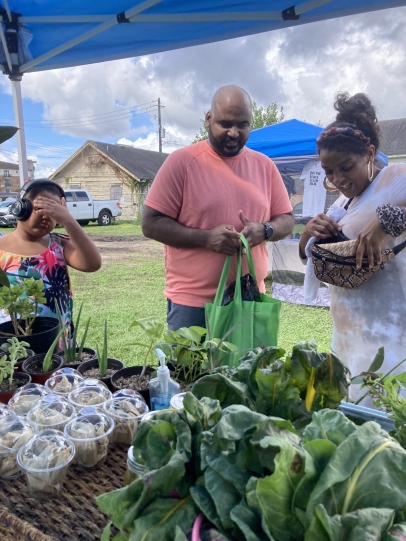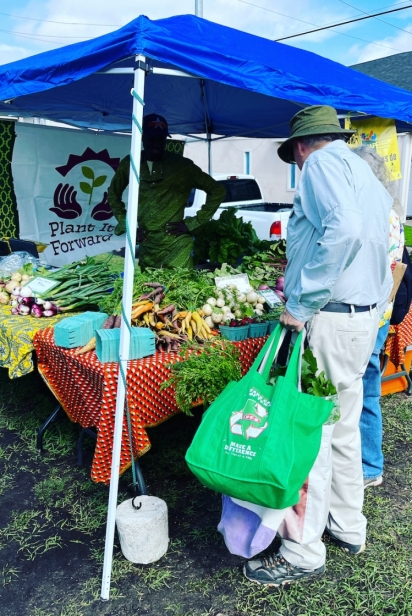A Taste of HISTORY
HOW FREEDMEN’S TOWN FARMERS MARKET IS HELPING REVITALIZE A HISTORIC HOUSTON NEIGHBORHOOD
Since its launch in 2020, the Freedmen’s Town Farmers Market has become a pillar of its community, having a significant impact on preserving the neighborhood’s history and culture and improving food security — despite gentrification and a global pandemic. Houston’s Fourth Ward, which is just west of downtown, is home to Freedmen’s Town, one of many African American communities formed post-Civil War by the formerly enslaved. Because of segregation, early Black residents of Freedmen’s Town had to develop the area on their own. It was a remarkable feat. They built homes, churches, schools, grocery stores, restaurants and hospitals, and even built the roads with handmade bricks — many of which still pave those streets. Founded in 1865, it’s considered Houston’s oldest Black neighborhood. Despite the past growth and success of Freedmen’s Town, it has become more isolated today as development has resulted in its gentrification. Stand in the middle of the historic brick roads running between the shotgun -style row houses, and you’ll see Downtown’s skyscrapers overlooking the community. Around the edges and even within pockets of the neighborhood, there are large plots reserved for new apartments and condos.
Although gentrification can result in positive outcomes — such as increased economic opportunity — we can’t ignore the adverse consequences: the displacement of a community’s culture, small businesses and low-income families as well as limiting access to affordable and healthy food.
Freedmen’s Town may be considered a short car ride from downtown Houston. However, it’s worlds away for residents without reliable transportation or the means to pay for public transit or a ride-sharing service. The closest grocery stores are a Kroger in River Oaks and a Randall's downtown; both require a 20 to 30-minute walk. Once you arrive, you can only purchase as much as you can carry home. It’s no surprise that the community has become the center of one of Houston’s food deserts.
Sade Perkins, a former resident of Fourth Ward, realized this was a problem when she had to make the trek for groceries after her car broke down. But to solve this, the neighborhood faced a conundrum: How do you increase access to affordable fresh food without succumbing to gentrification and risking the loss of the area’s cultural identity? For Perkins, the answer was clear: the community needed a farmers market — and she would lead the efforts to establish one. It would have multiple benefits, offering fresh, accessible food while also supporting local BIPOC-owned businesses and entrepreneurs.
THE START OF A LEGACY
When Perkins finally launched the Freedmen’s Town Farmers market in November 2020, no one anticipated that the outdoor grand opening would come with significant rainfall. No one could predict that a global pandemic, which resulted in food shortages in many communities, would threaten to shut down the market just as it was getting started. And with gentrification inching closer each day, no one knew what this would mean for a new enterprise intended to protect the people, history and spirit of Freedmen’s Town.
However, Perkins’ market remained resolute and even thrived in these conditions. Congressman Al Green visited and presented Perkins with a Certificate of Congressional Recognition during the grand opening (this accolade honors achievements of public distinction). Other local businesses and important figures have also shown their support over the years including Saint Arnold Brewing Company and Houston City Council Member Abbie Kamin.
The market has also garnered media attention. Bravo’s Top Chef brought season 19 contestants to Houston, allowing them to explore the history of Freedmen’s Town, browse the market’s offerings and create dishes for a community fundraiser. It remained outdoors during COVID-19, so visitors could safely shop and access fresh, healthy food despite the shortages.
GROWTH AND GENTRIFICATION
Although gentrification has become more of a reality, the Freedmen’s Town Farmers Market has brought the community closer together and has already generated enough economic activity ($250,000 in 2021) to rival that which would have come from urban development. Perkins notes that the market has aided the launch of several independent businesses, and she hopes that the market can continue to help vendors thrive in their own storefronts. “I love to see my vendors move on to bigger and better things ... but also keep us in their hearts!” she says.
Perkins has also ensured the market is accessible for as many customers as possible by accepting food stamps and becoming both EBT- and SNAP-certified. Perkins aims to continue educating the public about these and other low-income options for acquiring essential nutritional goods.
Unfortunately, the market continues to combat the consequences of development. “The City [has] eminent domained the lot that I was using,” says Perkins. It’s currently being employed to store equipment that’s being used to build high-rise apartments on Allen Parkway. Although the landowner, Mt. Horeb Missionary Baptist Church, is being compensated by the city for the lot’s use, Perkins is left without a space for the market and has had to temporarily close — leaving her vendors and community residents without an economic outlet or reliable food access once again.
Despite this setback, the vision that Perkins’ imagined for the market has remained vibrant and she remains hopeful the market will reopen, giving the community the opportunity to once again shop for fresh produce, and be able to enjoy live performances from African drummers and walking tours of the neighborhood led by the Houston Freedmen’s Town Conservancy.
According to Perkins, the market has quickly become part of Freedman’s Town’s soul and legacy, leveraging self-sufficiency and demonstrating entrepreneurship and creativity — attributes that make up the soul of Freedmen’s Town. “We’re part of the legacy now,” Perkins proudly states. And if the neighborhood can leverage these traits to stay strong in light of past and present challenges, why can’t the market?
THE FUTURE OF THE FREEDMEN’S TOWN FARMERS MARKET
In true Freedmen’s Town spirit, Perkins had been the sole organizer of the market since its inception. While it’s closed, she is using the time to obtain nonprofit status. This would allow her to seek out additional funding and hire a team dedicated to the organization's success. She also hopes to achieve more city and community support — a collaborative effort that would allow the market and community to thrive. “We have a lot of community support, but without both the city and community, it’s impossible for a market like this to exist.” Perkins says.
If you would like to offer support for Freedmen’s Town Farmers Market, contact Perkins on Instagram @freedmenstownfarmersmarket, facebook.com/FreedmensTownFarmersMarket or via email at freedmanstownfarmersmarket@gmail.com. You can also follow the market on social media for the latest updates.





